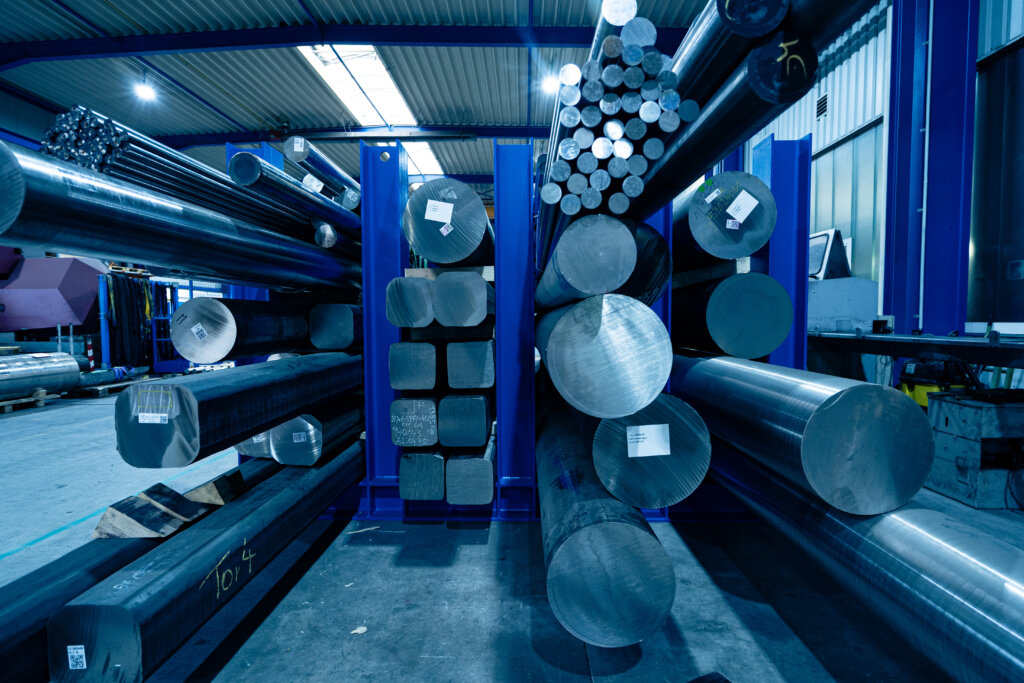1.3964 / Alloy 50 / XM-19

1.3964 – Non-Magnetic, High-Corrosion-Resistant Cr-Ni-Mo-N Steel for Demanding Applications
Properties of 1.3964 / Alloy 50
1.3964 is often used synonymously with Alloy 50 (UNS S20910, also known as XM-19), there are differences depending on the application. 1.3964 generally refers to the European variant, defined by precise chemical limits in accordance with DIN EN standards. Alloy 50 is the American designation for a comparable grade with slightly different chemical and mechanical properties according to ASTM/AISI.
The material offers:
- Excellent toughness at cryogenic temperatures
- Very good corrosion resistance in oxidizing environments
- Good weldability with a stable microstructure
- High strength combined with outstanding ductility
- Keeps relatively high ductility in cold worked condition
Although both 1.3964 and Alloy 50 are a high-alloy, nitrogen-strengthened Cr-Ni-Mo-N stainless steels known for its excellent resistance to seawater, intergranular corrosion, and stress corrosion cracking. The material design ensures significantly higher yield strength compared to conventional Cr-Ni-Mo steels and results in a stable austenitic microstructure that remains non-magnetic even after cold working – with a relative magnetic permeability below 1.01.
Both grades are non-magnetic, offer excellent corrosion resistance in seawater, and deliver high strength. Differences mainly appear in certifications and approvals, which may be critical depending on the industry or end use.
Applications of 1.3964 / Alloy 50
These grades are used in applications where a combination of high corrosion resistance, mechanical strength, and non-magnetic behavior is essential – especially in highly demanding or safety-critical environments:
- Cryogenic and low-temperature systems, such as for LNG and hydrogen liquefaction, where extreme cold resistance and material reliability are crucial
- Measurement and control systems, especially where magnetic interference must be avoided
- Scientific and high-tech applications, such as MRI equipment or particle accelerators, where low magnetic permeability is essential
- Medical devices with the highest demands for magnetic neutrality and biocompatibility
- Pumps, valves, and compressor components exposed to corrosive environments and mechanical loads
- Shipbuilding and custom machinery, including defense technology, where performance and material reliability are non-negotiable
- Luxury watches and precision components, requiring corrosion resistance, non-magnetic properties, and aesthetic surface quality
Specification Overview
| Material number | 1.3964 |
| Alloy | 50 / XM-19 |
| EN designation | X2CrNiMnMoNNb21-16-5-3 |
| UNS | UNS S20910 |
| ASTM | A479/A479M A276/A276M A182 |
| SEW 390 | |
| WL 1.3964 | -1: plate/sheet -2: round / flat / square bars -3: open die forged parts -6: seamless rolled rings |
Physical Properties:
| Material Density | 7.9 g/cm³ |
| Electrical Resistivity | 0.80 Ω·mm²/m |
| Thermal conductivity (20 °C) | 14 W/m·K |
| Thermal expansion coefficient | 15.5 ·10⁻⁶ /K |
| Magnetic Permeability | µr≤ 1.01 (non-magnetic) |
Mechanical Properties:
Typical at room temperature:
| Tensile Strength Rm | ASTM A479/479M 600–850 MPa | WL 1.3964-3 700–950 MPa |
| Yield Strength | ≥ 300 MPa | ≥ 365MPa |
| Elongation A5 | ≥ 35 % | ≥ 35 % (thickness≤160mm) ≥ 30 % (thickness≥160mm) |
| Hardness (Brinell) | 180–220 HB |
Typical Chemical Composition of Alloy 50 (acc. to ASTM A479/479M weight %):
| C | Si | Mn | P | S | Cr | Ni | Mo | N |
| ≤ 0.06 | ≤ 1.0 | 4.0 – 6.0 | ≤ 0.045 | ≤ 0.030 | 20.0 – 23.5 | 11.5 – 13.5 | 1,5 – 3.0 | 0.2 – 0.4 |
| Nb | V | |||||||
| 0.1-0.3 | 0.1-0.3 |
Typical Chemical Composition of 1.3964 (acc. to SEW 390 weight %):
| C | Si | Mn | P | S | Cr | Ni | Mo | N |
| ≤ 0.03 | ≤ 1.0 | 4.0 – 6.0 | ≤ 0.025 | ≤ 0.010 | 20.0 – 21.5 | 15.0 – 17.0 | 3.0 – 3.5 | 0.2 – 0.35 |
| Nb | ||||||||
| ≤ 0.25 |
Product Portfolio
We offer material 1.3964 in the following forms and processing stages:
Semi-finished products – from stock or custom production
Round bars and plates – hot-rolled or cold-drawn, raw or machined
Flat and square bars – sawn, ground, or polished
Seamlessly rolled rings
Forged components – e.g. hollow shafts, rotors, housings
Various precision-machined forgings – made to customer specification
Fully machined end components – ready to install, incl. EN 10204 / 3.1 or 3.2 certificates
All information without guarantee and for informational purposes only.